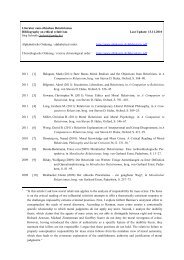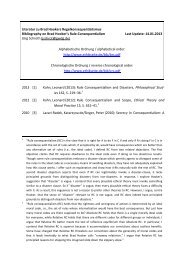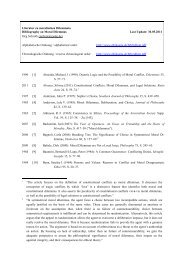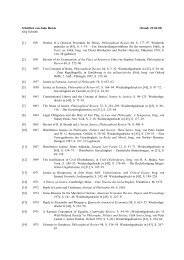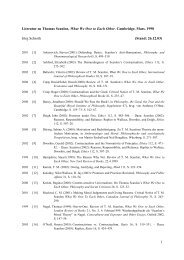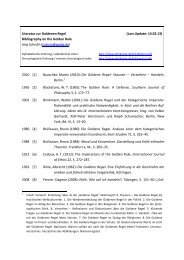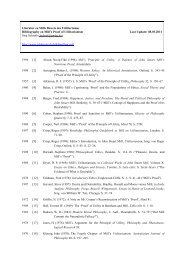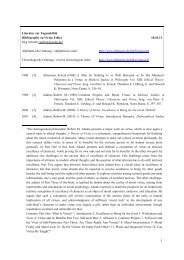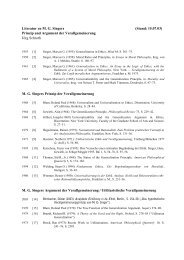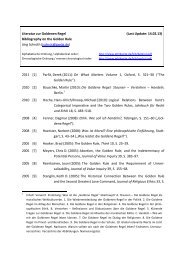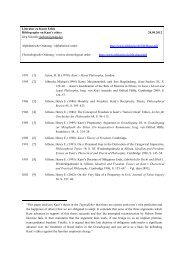Chronologische - Ethikseite
Chronologische - Ethikseite
Chronologische - Ethikseite
You also want an ePaper? Increase the reach of your titles
YUMPU automatically turns print PDFs into web optimized ePapers that Google loves.
2003 [502] Schroth, Jörg (2003): Der voreilige Schluß auf den Nonkonsequentialismus in der Nelson- und<br />
Kant-Interpretation, in Philosophiegeschichte und logische Analyse, hrsg. von Uwe<br />
Meixner und Albert Newen, Band 6: Geschichte der Ethik, Paderborn, S. 123–50.<br />
2003 [503] Taylor, Christopher R. (2003): Depositum II – Konrad Cramer’s Reflections on the Logical<br />
Structure of a Kantian Moral Argument, Zeitschrift für philosophische Forschung 57,<br />
S. 601–611. 129 – Zu [605]. Vgl. Dazu [506].<br />
2003 [504] Teehan, John (2003): Kantian Ethics: After Darwin, Zygon 38, S. 49–60.<br />
2003 [505] Tenenbaum, Sergio (2003): Speculative Mistakes and Ordinary Temptations: Kant on<br />
Instrumentalist Conceptions of Practical Reason, History of Philosophy Quarterly 20,<br />
S. 203–223.<br />
2003 [506] Timmermann, Jens (2003): Depositum I – Konrad Cramers Diskussion der logischen Struktur<br />
eines Kantischen Beispiels für moralisches Argumentieren, Zeitschrift für<br />
philosophische Forschung 57, S. 589–600. 130 – Zu [605]. Vgl. dazu [503].<br />
2003 [507] Timmermann, Jens (2003): Sittengesetz und Freiheit. Untersuchungen zu Immanuel Kants<br />
Theorie des freien Willens, Berlin, New York, S. 145–88 („Kapitel IV. Maximen“),<br />
189–207 („Kapitel V. Moralische Motivation: das Phänomen der Achtung“).<br />
2003 [508] Trampota, Andreas (2003): Autonome Vernunft oder moralische Sehkraft? Das epistemische<br />
Fundament der Ethik bei Immanuel Kant und Iris Murdoch, Stuttgart.<br />
2003 [509] Unna, Yvonne (2003): Kant’s Answers to the Casuistical Questions Concerning Self-<br />
Disembodiment, Kant-Studien 94, S. 454–73.<br />
2003 [510] Weber, Michael (2003): The Motive of Duty and the Nature of Emotions: Kantian Reflections<br />
on the Moral Worth, Canadian Journal of Philosophy 33, S. 183–202.<br />
129 “Konrad Cramer, in “Reflections on the Logical Structure of a Kantian Moral Argument”, argues that the<br />
Universal Law Formulation (UL) of the Categorical Imperative is best understood as providing us with an<br />
indirect method for determining the moral permissibility of acting on our maxims. He then goes on argue,<br />
however, that no interpretation of UL is consistent with Kant’s epistemic claim that we can easily discover<br />
what morality demands of us. In response I argue that Cramer relies on an excessively demanding interpretation<br />
of Kant’s epistemic claim and that his indirect interpretation of UL rests on a problematic account<br />
how our maxims relate to the actions that we perform on their basis. I then turn to the question of the overall<br />
plausibility of UL, and stress the need to interpret it within the context of Kant’s overall moral system.”<br />
130 „Kant vertritt in der Kritik der praktischen Vernunft und im Gemeinspruch die Auffassung, daß man eine<br />
Leihgabe auch dann nicht einfach einbehalten darf, wenn dies gefahrlos möglich wäre. Wie Konrad Cramer<br />
allerdings in seinem Aufsatz zum „Depositum“ zeigt, ist es gar nicht so leicht, auf der Grundlage der Kantischen<br />
Ethik ein gutes Argument für diese Auffassung zu rekonstruieren. Im Ausgang von Cramers Kritik<br />
wird hier der Versuch unternommen, Kants Position zu stärken: Die Maxime desjenigen, der das hinterlegte<br />
Gut einbehält, ist die, sein Vermögen mit allen sicheren Mitteln zu vergrößern; wäre nun diese<br />
Maxime allgemein verbreitet, so würde es der ursprüngliche Eigentümer gar nicht wagen, sich von seinem<br />
Eigentum zu trennen. Es gäbe keine Deposita. Derjenige, der sich so am Gut eines andern bereichern<br />
möchte, untergräbt bei Allgemeinheit seiner Maxime tatsächlich die Bedingung der Möglichkeit der<br />
Einbehaltung des Depositums. Entscheidend wichtig für den Erfolg der Rekonstruktion ist die präzise<br />
Unterscheidung von „Regeln“ und „Maximen“.“



